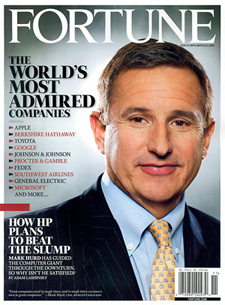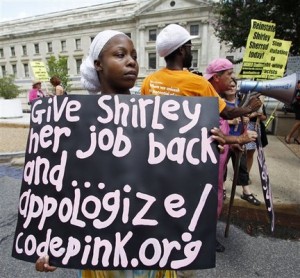 |
| HP Ousted CEO Mark Hurd |
OMG! “Hewlett Took a P.R. Firm’s Advice in the Hurd Case” blares the headline on the business pages of today’s New York Times. No s**t, Sherlock! Of course, the company and its board sought counsel from an established public relations firm. To whom should they have turned? A priest?
The piece went on to question the agency’s credentials to handle such matters. Trust me, APCO is no fly-by-night agency. While Times SF-based technology reporters Ashlee Vance and Matt Richtel may not be as familiar with the firm, APCO certainly owns its share of pertinent credentials to advise HP’s board. From The Times:
“According to a person briefed on the presentation, the representative from the APCO public relations firm even wrote a mock sensational newspaper article to demonstrate what would happen if news leaked. The specialist said the company would be better served by full disclosure, even though an investigation had produced no evidence of sexual misconduct.”
Perhaps one of the Valley’s myriad social media specialty boutiques would have been better equipped to advise the company? Doubtful.
Still, the decision to request Mr. Hurd’s resignation may or may not have been the correct one. Would the story have had greater media legs and caused more pain to HP had Mr. Hurd stayed on to endure Gloria Allred’s self-aggrandizing brand of reputation deconstruction? It’s not an easy question to answer.
In crises, decisions are made based on the information available at the time. Every crisis is distinct. There is no set playbook. You go with what you know, even though, a different set of circumstances may manifest later. Oracle chief Larry Ellison, no stranger himself to corporate excess, weighed in on Mr. Hurd’s side:
“What the expense fraud claims do reveal is an H.P. board desperately grasping at straws in trying to publicly explain the unexplainable; how a false sexual harassment claim and some petty expense report errors led to the loss of one of Silicon Valley’s best and most respected leaders.”
While Jeffrey Sonnenfeld, “an expert in corporate governance and senior associate dean at the Yale School of Management, said Hewlett-Packard’s directors deserved credit.”
“The company ‘stands apart from other companies that have been scandalized in the headlines this year,’ he said, referring to BP and several Wall Street firms. ‘They made a courageous call.'”
The Business Insider’s Henry Blodget, who himself lived through a forced resignation, provides his insightful take on the HP imbroglio today in which he concludes
“…the details leave big questions as to what really happened.”
If the company had truly erred in its understanding of the allegations and went ahead to demand Mr. Hurd’s resignation, maybe it should now consider reinstating him as CEO? Didn’t the Obama Administration recently have the kahunas to admit that it had over-reacted to a trumped up (eg, patently false) report about one of its administrators?
Then again if the initial (and expected) Friday-issued bad news announcement had focused instead on the financial improprieties of Mr. Hurd’s expense report, and not on the now dubious sexual harassment allegations, the mediasphere would not be in a frenzy to pick apart HP’s (and its PR firm’s) decision.
But again, you go with the cards you’re dealt, and hope you prevail.

Arthur,
I couldn’t have said it any better myself. Thanks for weighing in.
Best,
Peter
Great post, Peter.
The truth is, we’ll never know all the various considerations that led APCO to its recommendation, such as what HP’s investigations did or did not find, or whether HP was completely forthcoming with details of the situation. Still, there’s good reason to believe that APCO’s advice will serve HP well in the long run, given corporate America’s growing appreciation for the power of reputation. Increasingly, companies are finding that behaving “in the way the public expects” can be a critically important asset.
APCO also gave HP advice in keeping with PRSA’s Code of Ethics, which advocates for honesty, accuracy and transparency in all communication. APCO’s counsel also reflects the thinking of public relations pioneer Arthur W. Page, who noted that performance is the determinant of reputation. Viewed in this context, APCO no doubt felt it would be better for HP to be transparent and cede short-term profits for the long-term reputational — and quite possibly financial — benefits of behaving in a way the public expected.
Because, as Page also reminded us, “all business in a democratic country begins with public permission and exists by public approval.”
Arthur Yann is VP, public relations, for the Public Relations Society of America (PRSA).
I definitely agree that every dilemma has a different solution, it may vary on what is at risk and what is involved. Also, the first thing to do I must say is to see the main problem and seek the best solution for it, probably by level and its impact on the company concerned.
Nicely stated, Davina.
Thanks for sharing your thoughts,
Peter
I agree that each crisis is different, which is why it’s important to ID the problem asap. Yes you gotta play the cards you’re dealt but you also need to know what game you’re playing.
Is it real or perceived, surrounding a product or a person? Level of impact (public embarrassment, product recall or global disaster); casualties, fatalities, economic impact; isolated vs. wide-spread?
There is a difference in a sex scandal with one exec vs. a mass tragedy with unknown human, economic and environmental impact. Different cards, different players can change the game plan in a hurry. FWIW.